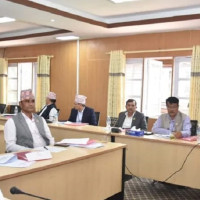- Sunday, 3 August 2025
Lower House passes much-awaited Federal Civil Service Bill
By Arpana Adhikari,Kathmandu, June 30: After 15 months since its registration in the House of Representatives (HoR) in Falgun 2080, the Federal Civil Service Bill, 2080 was passed by majority on Sunday.
The endorsed bill has amended provisions related to the age limits for entry and retirement in the civil service, the criteria for filling positions, transfers, and conditions for constitutional appointments after retirement. Now both classification and level systems will be implemented in the civil service.
The bill introduces key provisions including a two-year cooling-off period, raising the age limit for retirement from 58 to 60 years, and a new post of Additional Secretary at the 13th level.
Minister for Federal Affairs and General Administration, Rajkumar Gupta, had presented the bill, along with the report from the State Affairs and Good Governance Committee.
The bill was passed after Minister Gupta responded to the questions raised during the discussion on the proposal.
Responding to the queries of MPs, Minister Gupta said that the bill aligns with the Constitution of Nepal, 2015 and it would support administrative federalism.
As the majority of members of the House of Representatives agreed to the proposal, Speaker Devraj Ghimire announced the bill’s endorsement.
Speaker Ghimire hailed the bill as a historic step toward successful implementation of federalism.
The bill was registered in the HoR on March 4, 2024. Following a general discussion, it was sent to the State Affairs Committee for clause-wise deliberation on May 28.
Provisions of the Bill
The bill raises the mandatory retirement age for civil servants from 58 to 60 years. However, the retirement age will be raised in phases, it will remain 58 in the first fiscal year, increase to 59 in the second year, and reach 60 from the third year onward.
According to the recommendations of the commission, an immediate jump to 60 would have stopped retirements and frozen new recruitments. Therefore, based on the Public Service Commission’s recommendation, the committee adopted this phased approach.
The government’s original proposal had aimed to raise the retirement age from 58 to 60 all at once.
Likewise, the entry age for the federal civil service has been set at 35 for men and 39 for women. Currently, the entry age is 35 for men and 40 for women, but lawmakers lowered the limit for women to 39 to ensure they can complete the required 20 years of service to qualify for a pension.
The Public Service Commission had suggested lowering the entry age further to 32 for men and 37 for women, alongside increasing the mandatory retirement age to 60.
Similarly, the bill has created the position of Additional Secretary. The Additional Secretary will occupy the 13th level in the civil service hierarchy, while the Secretary and Chief Secretary will hold the 14th and 15th levels, respectively. These three posts are classified as gazetted special class positions.
The position of Additional Secretary has been created for deployment in departments. Correspondingly, the number of Joint Secretary posts has been reduced proportionally.
Similarly, the bill has provision that the Provincial Chief Secretaries will be under the federal government’s authority, whereas Provincial Secretaries will fall under provincial jurisdiction. Chief Administrative Officers at the provincial level will be part of the Provincial Civil Service.
However, until Provincial Secretaries and local Chief Administrative Officers are appointed, the federal government may deploy officials to these roles for up to ten years.
Likewise, the position of Joint Secretary and non-gazetted officer will no longer be filled through open competition. Currently, 10 per cent of Joint Secretaries, classified as gazetted first class, are recruited this way. The bill also stipulates that 60 per cent of Section Officers (Shakha Adhikrit) will be recruited through open competition.
Similarly, the bill includes a two-year cooling-off period, during which civil servants who have resigned or retired will be ineligible for any diplomatic or constitutional appointments.
Additionally, the tenure of Nepal’s Chief Secretary has been reduced from three years to two, and the tenure of Secretaries has been shortened from five years to four. However, this reduction will not apply to the current Chief Secretary and Secretaries, who may continue to serve up to five years.
The bill also stipulates that no employee can be transferred before completing at least one year in their current position. Similarly, the arrangement for the trade union remains unchanged.
The bill also has a provision for inter-provincial transfers. Transfers between provinces and between local levels will be permitted with the mutual consent of the Council of Ministers of the concerned provinces.
Similarly, positions filled through the Provincial Public Service Commission may also be transferred elsewhere after ten years.
The bill will now be sent to the National Assembly, after which it will return to the House of Representatives.
The House will then forward it to the Office of the President for authentication. Once authenticated and published in the Nepal Gazette, the bill will come into effect.
















